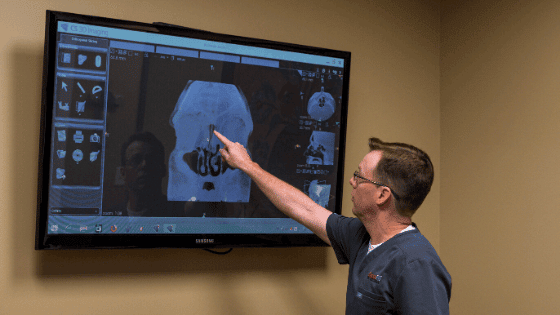Sinus problems can be frustrating and often seem to get worse when we least expect…

Does an ENT Specialist Treat That? All About Sinuses
ENT Specialists
When was the last time that you had a cold? You probably battled nasal congestion, but luckily, your stuffy nose cleared up with the virus, right? If not, then you may be one of the many people who suffer from persistent nasal congestion or irritation. Breathing is an essential feature of life, but one that many of us take for granted. Whether you’re suffering from a sinus infection or are thinking about sinus surgery, it’s time to find an ENT specialist who can help you breathe easy.
In this article, we’re sharing some of the sinus therapies and surgeries that we offer at ExcelENT. We assist our patients in everything from at-home nasal rinses to surgeries and innovative, non-invasive procedures to improve their breathing.
What is sinusitis?
Sinusitis is inflammation and swelling of the sinuses, which are a connected system of small, hollow cavities in your head. Everyone experiences sinusitis throughout their lives. For most people, the sinusitis is acute, or short-lived. Usually, it accompanies a cold, and the inflammation goes away when you recover.
Symptoms of acute sinusitis are:
- Facial pain or pressure
- A “stuffy” or runny nose
- Reduced sense of smell
- Cough and congestion
Chronic sinusitis is persistent swelling from conditions such as a sinus infection, allergies, nasal polyps, or a deviated septum. When the sinuses are chronically inflamed, they trap mucus, which makes them more susceptible to bacteria growth and infection.
Symptoms of chronic sinusitis are:
- Congestion or “fullness” in the face
- Blockage in one or both nasal passages
- Fever
- Runny nose
- Discolored postnasal drainage (drainage at the back of your throat)
- Pus in the nasal cavity
- Headaches and fatigue
Treating chronic sinusitis can be challenging. Often, it takes a combination of several methods, including nasal irrigation, decongestants, or antibiotics. Patients who do not find relief from those methods may require treatments such as endoscopic sinus surgery or balloon sinuplasty.
The benefits of nasal irrigation
Your nose is like a filter that uses layers of mucus to trap particles so that they don’t get to your lungs. Unfortunately, dryness and inflammation make it harder for the sinuses to drain properly. Using nasal irrigation, also called a nasal rinse, can help thin the mucus so that it flows out of the nose, rinsing bacteria and irritating particulates away with it.
Using a saline rinse is simple, especially if you use a premixed solution like NeilMed. You should mix distilled water and a NeilMed sterile packet to create a saline (saltwater) solution. Lean your head over the sink and flush the saline into one nostril. The water will flow through your sinuses and out the other nostril, taking allergens and bacteria with it.
You can perform nasal irrigation daily, as your cold, allergy, or chronic sinusitis symptoms warrant it.
What is a deviated septum?
Your septum is the wall between your nostrils that separates the nasal passages. When a septum is deviated, it is bent or crooked, which causes blockage in one of the nasal passages. Some people are born with a deviated septum, and others sustain an injury that damages it.
The surgery to repair and straighten the septum is called septoplasty. It’s an option for patients who have not had success with non-invasive treatments. Results vary from person to person, but many people experience an improvement in their breathing after the procedure.
Vivaer® nasal airway remodeling
People who suffer from chronic nasal obstruction may benefit from a new, in-office procedure called Vivaer®. The treatment uses low-temperature radiofrequency energy to gently and permanently reshape the nasal valve. It can be an excellent procedure for patients who have narrow nasal valves and who either aren’t interested in or wouldn’t benefit from a septoplasty.
After the Vivaer® procedure, patients immediately begin to experience improved breathing. If you’re tired of nasal strips and nasal sprays then you may be interested in speaking with Dr. Davis about whether you’re a candidate for Vivaer®.
Balloon sinuplasty promotes sinus drainage: a minimally invasive technique
Dr. Davis is excited to offer patients a revolutionary office treatment for mild to moderate chronic and recurrent sinusitis called balloon sinuplasty. During the procedure, Dr. Davis threads a small catheter through the sinus opening and inflates a balloon with water. The balloon dilates the sinus opening and widens the outflow tract, which encourages it to drain.
The procedure is a quick, non-invasive way to improve drainage, reduce the potential for bacterial infections, and improve breathing. Numerous studies have shown that 90-95% of balloon sinuplasty patients benefit from the procedure for at least two years.
Is it time to consider functional endoscopic sinus surgery?
Functional endoscopic sinus surgery is a procedure that your ENT surgeon can use to treat moderate to severe sinus surgery. If you’re no longer responding to treatments like nasal irrigation, antibiotics, and decongestants, then you may be a candidate for sinus surgery.
During the procedure, Dr. Davis uses an endoscope to locate and remove bone and tissue in the sinuses that are preventing drainage. Sinus surgery creates larger drainage pathways to reduce the chances of mucus buildup after recovery. In addition, medicated sinus rinses can better penetrate the opened sinuses to help reduce inflammation. Patients will need to undergo general anesthesia for the procedure, which usually takes between one and three hours. However, recovery is typically quick, with very little pain.
SINUVA: An innovative treatment for nasal polyps
Nasal polyps are soft, painless, benign growths in the nasal passages. Prolonged inflammation and swelling of the sinuses from infection and allergies may increase a person’s likelihood of developing polyps. For many people, nasal polyps are a chronic problem that persists throughout their lives.
Common nasal polyps symptoms are:
- Runny nose
- Persistent congestion and sinus pressure
- Postnasal drip
- Reduced senses of smell and taste
- Pain in the upper teeth and face
- Snoring
- Nosebleeds
- Headaches
Common treatments include anti-inflammatory, steroid nasal sprays, nasal irrigation, and surgery to remove the polyps. Unfortunately, surgical removal of polyps isn’t always permanent, and the polyps may grow back.
SINUVA is an innovative, non-invasive nasal implant that delivers an anti-inflammatory corticosteroid (mometasone furoate) directly to the polyps. An ENT doctor can place the SINUVA implant in the office if the patient has had previous endoscopic sinus surgery. The implant stays in place for approximately 90 days, after which the doctor will remove it. SINUVA successfully reduces polyp inflammation without surgical intervention.
We’re passionate about sinuses!
The team at ExcelENT of Alabama is passionate about sinus health and helping patients breathe better. Whether you’re having a bout of acute sinusitis or suffering from persistent nasal blockage, get in touch with Dr. Davis. He’ll get you feeling better in no time!
Service Page Sidebar Form
"*" indicates required fields


